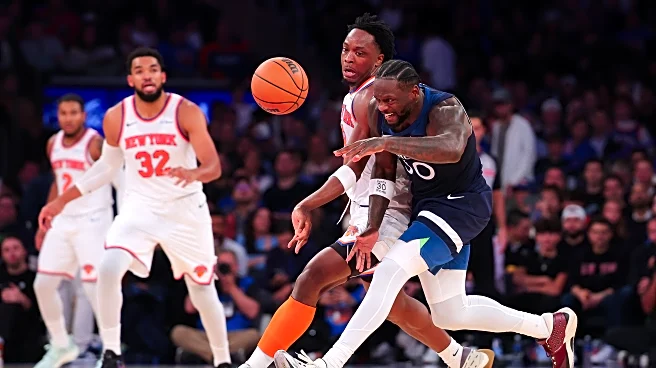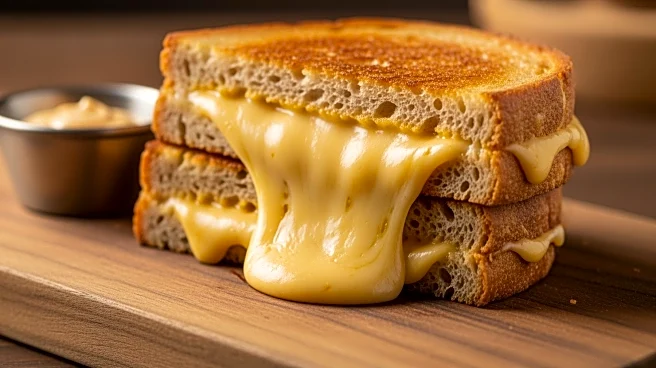You know those games that start with so much promise you can practically hear the NBA’s marketing team high-fiving in the background? That was Wolves-Knicks in Madison Square Garden. Karl-Anthony Towns
versus Julius Randle, the blockbuster trade reunion, Anthony Edwards finally back from the hamstring scare under the world’s brightest lights. ESPN cameras everywhere, the Mecca humming. It had “classic” written all over it.
For a half, it even looked like it. Minnesota jumped out 13-4 behind crisp ball movement, and Randle going right at our old buddy Towns. The Wolves looked sharp, until they didn’t. The defensive intensity dipped, the turnovers spiked (again), and before you could say “Towns revenge game,” the Knicks had cut it to 15-14. Cue the Finch facepalm and the inevitable call for Conley, who responded by splashing a three to stop the bleeding. It was that kind of night, small moments of poise surrounded by longer stretches of “what the hell was that?”
Randle, though, was cooking. He was the adult in the room, bullying inside, hitting threes, kicking out to Donte DiVincenzo for wide-open looks. Jaden McDaniels chipped in a big three as part of a 14-0 second quarter run that had Wolves fans thinking maybe, just maybe, this would be one of those Garden statement wins. During that run Rudy Gobert’s defense was a masterstroke. Suddenly the paint closed like a bank vault; the Knicks were forced into bad shots, and Minnesota swaggered into halftime up 58-54. Randle had 18, Donte had 12, and both looked like men still trying to prove something to their old team.
Then came the third quarter, where the Wolves’ promising first half went to die. You could almost feel the air leak out of the balloon. Towns hit a three over a lazy closeout from Randle to put the Knicks up 66-65, and that was the pivot. The Knicks started humming with quick passes, corner threes, and ball movement that screamed “we’ve played together for years.” Minnesota? Turnovers, broken possessions, missed rotations, and the body language of a team wondering why the Wi-Fi suddenly cut out mid-game. A 9-point deficit ballooned quickly to double digits. Anthony Edwards, understandably rusty, tried to don the cape, but the explosion wasn’t there yet. He finished with 15 quiet points, the kind of “still getting my legs under me” performance that made you nervous about how tight that hamstring really is.
Mitchell Robinson, meanwhile, turned into 1996 Dennis Rodman for a few minutes in the third quarter, inhaling offensive rebounds and demoralizing every Wolves big in sight. Finch’s squad had no answers. By the time the quarter ended, it was Knicks 94, Wolves 86, and it felt worse than that. The fourth quarter was just an exercise in prolonging the inevitable. The Knicks rained down open threes, Minnesota kept dribbling into traffic, and the rebounding battle continued to be horribly lopsided. Around the five-minute mark, Finch waved the white flag, subbing out Edwards for Rob Dillingham and eventually letting the bench crew finish the mess. Final score: Knicks 137, Wolves 114, a 23-point Madison Square Massacre.
Randle ended with 32-5-4, playing with that delicious mix of anger and control that made you remember why the Wolves traded for him in the first place. DiVincenzo added 21 and more hustle plays than the box score will ever capture. Towns was solid, Brunson was steady, and the Knicks looked like the better-coached, better-connected team.
Finch’s postgame summary was equal parts accurate and depressing: poor rebounding, careless turnovers, and the effort gap. You can’t spot a team like New York a dozen extra possessions and expect to steal a win in their building. The Wolves hung for a half, but the second-half malaise was all too familiar: lazy closeouts, no rebounding discipline, and zero ball movement. The point-guard void was glaring. Conley’s steady hand works in stretches, but when the wheels come off, this team doesn’t have a conductor to slow the train.
If you’re looking for a silver lining, it’s this: Randle looks completely comfortable as a leader, DiVincenzo is becoming the most reliable secondary scorer since peak Wally Szczerbiak, and Edwards, well, he played, which is progress. The Wolves are 4-4 now, wobbling somewhere between “contender trying to find itself” and “talented team that can’t get out of its own way.” Nights like this separate the disciplined from the delusional. The Knicks played like a group that remembers how close they came last spring. The Wolves played like one that’s still trying to convince itself the conference finals weren’t a dream.
Big picture? Not a disaster. But not good, either. It’s early November, and the Wolves have time to clean it up. Still, if they want to be taken seriously out West, they’ll have to learn that highlight dunks and viral moments don’t mean much when you’re getting out-hustled for every loose ball. MSG showed them what a focused, connected team looks like. Now it’s their turn to prove they can be one again.










